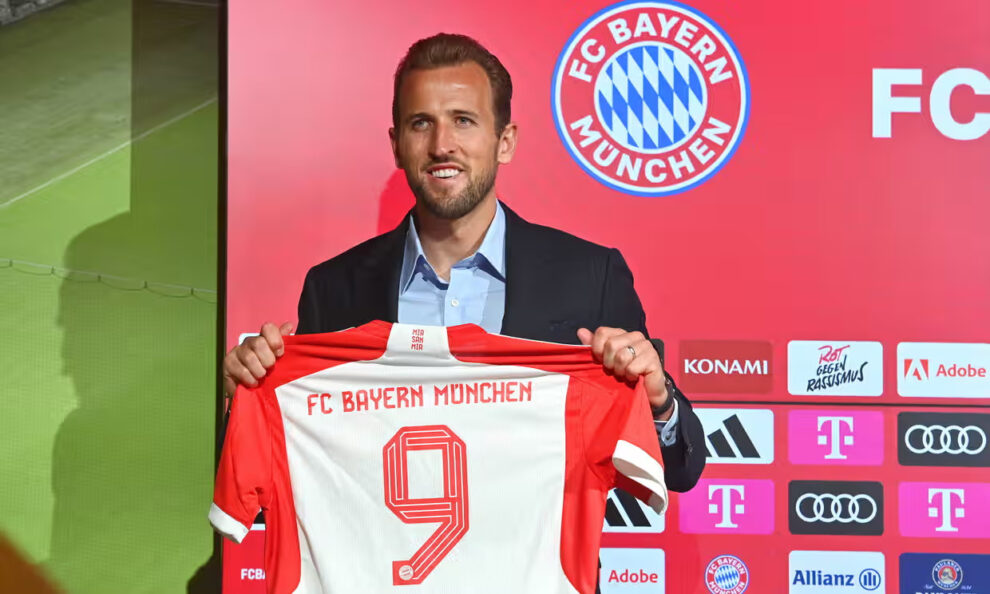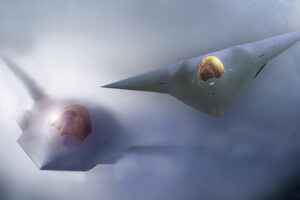There may have been tens of thousands of Harry Kane fans tracking his Cessna flight’s path to Munich on Saturday, followed by standing ovations when he finally appeared before Bayern Munich supporters – many already wearing “Harry Kane – 9” shirts – to the stirring strains of Rock You Like a Hurricane by German rock band the Scorpions, but scepticism about the wisdom of the Tottenham Hotspur striker’s £100m transfer was rife among German commentators.
The affection for the 30-year-old striker was not in doubt. “Citizen Kane is now officially a Bavarian!” ran one typical headline, and the greetings servus (hello) and willkommen (welcome) towards “Herry” (as some Germans pronounce it) came thick and fast at his first press conference, at which he was flanked by bottles of water and Bavarian wheat beer.
The tabloid Bild led the call for a period of reflection after the feverish negotiations, however, calling the price paid for Kane “a damning indictment for Bayern … for German football” and accusing the top managers of the game in Germany of being in “deep sleep mode”.
“At what price?” the paper asked its readers on Sunday. At stake, it said, was nothing less than the future of German football’s ability to nurture its own talent. “Why have we not managed for years to develop our own talented centre-forwards, of which we used to have a constant supply? And why are we not drawing on our own younger players, especially as the English are way beyond us financially?”
It concluded it would have been far more preferable to have invested the money in the future. “A few of the Kane millions would probably have been put to much better use for youth training,” it wrote.
The excitement at the weekend was undeniable, over everything from the very fact Kane had chosen to come to Germany, to where he would choose to live; and from whether his fourth child, due in two weeks, would be born in Germany or the UK, to his enthusiasm for embracing the culture and learning German (two lessons a week were already booked in, he told journalists, pointing out his ability was as yet limited to that one, very Bavarian word, servus). Yet many were flummoxed by the scale and audacity of the deal.
His unfortunate debut result – unable to help his new team against RB Leipzig after coming off the bench in the 63rd minute – did nothing to dampen the lack of conviction. “First Kane hype, now the hangover,” ran the headline in Der Spiegel, after the 3-0 defeat at the Allianz Arena.
The news magazine quoted Max Eberl, RB Leipzig’s sporting director, who said: “It’s almost too much, what is being expected of Kane. It’s like he’s the messiah, who walks on water.” Football is not down to single players, he said. “It’s a team sport.”
Der Spiegel said Bayern had pulled off a “prestige coup”. But, it added: “For German football it simply means things will get more boring … This is, in the first instance, good for Bayern, but there has to be doubt cast over whether this is useful for the Bundesliga, as both are intertwined.”
As Bayern has a habit of snapping up most titles year after year – notwithstanding the upset by Leipzig – the arrival of someone of Kane’s calibre will only reinforce this trend, the paper suggested.
Its football expert Danial Montazeri said Kane would make Bayern far more dangerous in the penalty area, where he felt at home.
Being an excellent setter-upper of goals will help lots of strikers at the club – in short, he will make the team much more versatile, Montazeri said.
“With Harry Kane, Bayern Munich are now one of the potentially strongest counteroffensive teams in the world,” according to Montazeri, but that in turn, he argued, would reduce yet further the already low level of competitiveness between Bayern and the rest of the Bundesliga, and it is doubtful whether it will help Bayern’s chances in the Champions League.
Borrowing the pregnancy of Kane’s wife, Kate, and the impending birth as a metaphor for the nine-month negotiations followed by the painful contractions of the final days, the Süddeutsche Zeitung said the “crazy deal” would “have to be analysed by historians and will indeed go down in history, as being the first in which such a large number of participants completely lost it”.
Die Zeit accused Bayern of actively participating in the type of turbo-capitalism that has so far been largely, refreshingly absent from German football, quoting the former player and now executive Uli Hoeness, who remarked earlier this year that the club would be “completely crazy” to buy Kane for anything like the sums that were being touted.
The fans, said Die Zeit, were “nevertheless happy”. And the weeks of negotiating, with the “boring hourly updates” that accompanied them, “fit very well into the era of commercial football. Media, as well as fans, are crying out for more investment, as if there were no other methods with which to put a team together and build it up. For example, like something as old fashioned as promoting young homegrown talent.”
Source : The Guardian









